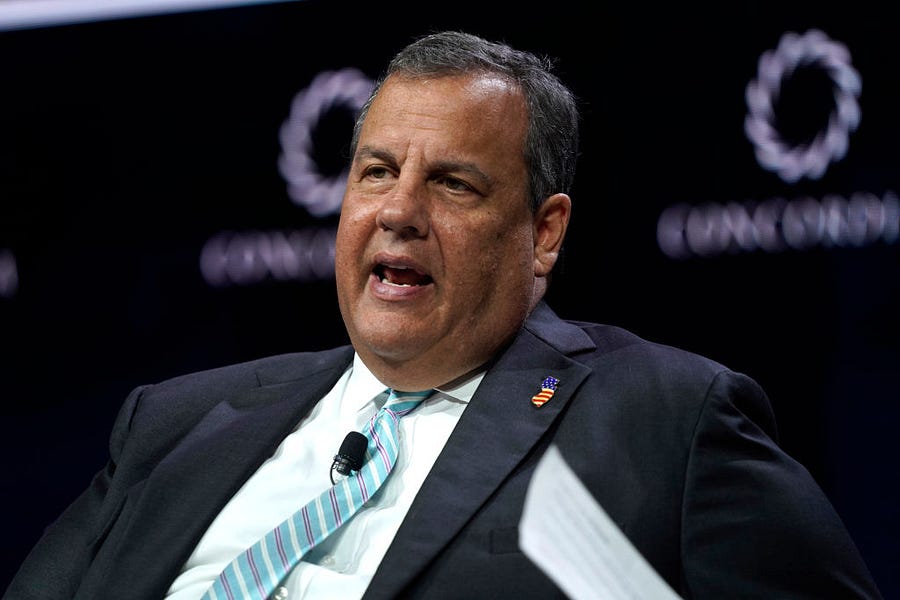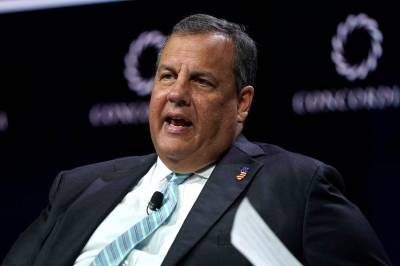Chris Christie, former New Jersey governor, wants to be president. He’s currently making the media rounds to promote his latest book, Republican Rescue: Saving the Party from Truth Deniers, Conspiracy Theorists, and the Dangerous Policies of Joe Biden. On Monday, The Dispatch had a two-hour lunch with him to figure out how he’s approaching politics these days. Christie, sporting cufflinks that had a tiny presidential seal on top of an American flag, held forth on everything from his 2016 endorsement of then-candidate Donald Trump, to the Biden presidency, to the state of the Republican party. Your Morning Dispatchers peppered him with so many questions that he had time to eat only half of the cheeseburger he ordered.
The following transcript has been edited for clarity and concision.
The Dispatch: You’re in the hospital with COVID-19 for seven days in 2020. It seems like you re-evaluated, reprioritized some things in your life. Why stay involved in politics?
Chris Christie: It’s in my blood. It’s always been what I’m most passionate about and what gets me out of bed in the morning.
It gives you life? It doesn’t take away?
It does both. The last four years, I’ve been making money. But what I do every day doesn’t jazz me.
What’s missing from your life?
I like making a difference. I was saying this to another governor who’s getting ready to be term limited. And he’s trying to decide what to do with his life and his career. And I said to him, “Look, one of the things you need to know is, the music stops. Like you watch your [successor] get sworn in, the troopers take you back to your house, you wake up the next morning, and they’re gone. And the cameras are gone. And the phone calls stop, and the music stops. And you got to figure out that okay, what do I substitute in for that?” So I said to him: “Before you decide whether to run for something else or not, and before you dismiss running for something else, just understand the music stops.” So I think the biggest thing is just not being able to make a difference. Not being able to get that stuff done and being at the mercy of other people to do it. You want to get back to doing that. And I also think, unfinished business from 2016.
Now that Trump lost, do you think he’d change his 2020 campaign?
No, because he didn’t think he lost.
He still thinks he won?
Yes.
But in the days after the election, he told multiple people that he knew he lost.
It's my understanding, yeah.
But now, he, that MyPillow dude, Sidney Powell, Rudy ...
A bunch of them—[Trump lawyer] Jenna [Ellis]—a bunch of them—that other guy, [Claremont Institute lawyer John] Eastman—have just convinced him. I spoke to him the Saturday after the election when Biden was declared the winner. And I called him and I said, “Politics is a tough business. All of us who get into it, get into it, because we want to win.” I said, “But you have to concede, and just put it behind you. If you want to protect any legacy that you have, you can't go any further down this road. And if you do it the right way. I said, I think people would admire you for doing it. And then if you want some kind of future, you could potentially have it. If you go down this road, it's gonna go to a bad place.” And he paused for like a second or two. And he said, “Well, I'm never doing that. So what else you got?”
Somebody asked me the other day, why did you continue to give him advice, if he rejected it so often? I felt like it was my responsibility. If you have the president's phone number and you have that access, and you don't use it to try to make it better? Who the hell are you? He's the president. So you may win one. If you win one, you may make him a little bit better, make the administration a little better, make the country a little better. I did keep doing it until we just reached a breaking point. We couldn't communicate. That was after the election, just because we so fundamentally disagreed with each other's approach to the post-election period, that it impeded our ability to communicate about anything else.
You mentioned that you think Mitch McConnell is doing a good job keeping the Senate calm. What do you think about Kevin McCarthy and his ability to rein in his conference?
He's got the worst job in the city. I like Kevin, personally, and I think it's an impossible job. I don't think there's anybody in that caucus who could do better. He's doing about as good a job as he could. I don't agree with everything Kevin does. I've told him that. But I like him. And I think his intentions are good. And I think if you took him out and put someone else in, it would get worse, not better.
So you think he’d make a good speaker?
Well, it depends on how he gets to be speaker, right? How do you get the majority? Do you get the majority with some center-right traditional Republicans ? Or do you get to the speakership because of redistricting with a lot more really hard, deep-red districts that wind up getting you there? It's two different jobs at that point.
The problem is though, that he's okay with the nuts, right? He's empowered the nuts. He's defending Paul Gosar, he's defending these [cartoon] videos. He refused to discipline Gosar when Gosar gave a speech at a white nationalist conference— nothing happens. 'But if Liz Cheney says, “I disagree with Donald Trump,” she's out. Or [New York GOP Representative] John Katko. There was a measure to strip him of his ranking membership.
Well, look. I think that's a reflection of the caucus.
But that's not leadership. That’s just being dragged along by the nuts.
On Liz, I would differ a little bit. Because Liz said the stuff she said, they had a leadership vote, and she won. And she won pretty convincingly. And she couldn't have done that without his support. Right? Then Liz just kept at it. At that point, I would have said, “I made my point. And I won the vote. Okay, now we're gonna get back to the substantive issues that we have to deal with, with Biden and Harris and Pelosi and the whole crew.” Once you win that vote, then you put the megaphone down. You've made your point.
Trump didn't stop and the other Republicans didn’t stop. Kevin McCarthy said, “We can't have somebody who's looking back.” Trump every day is looking back, and Marjorie Taylor Greene is looking back, and Madison Cawthorn.
I'm really clear in the book on Marjorie Taylor Greene—she's crazy. But you know what the problem is? If the people of her district send her, I don't think it's Kevin McCarthy's job to say, “You're out of here.”
No matter what she does? Is there a line?
I guess if she committed a crime then the law enforcement authorities would take care of somebody like that. But I don't know what you do if [voters] keep sending her back. It was like [Steve] King, right? The Iowa district kept sending him back. If the people of one of those 435 congressional districts send her, what is McCarthy supposed to do about that?
Aren't there lines? There have to be lines. You’re making an adequate defense of — politics-as-coalitions. I get it. But doesn’t the substance actually matter? Like Marjorie Taylor Greene says crazy [stuff] all the time.
Which I document in the book.
At a certain point, don’t you say, this party—we don’t want people who say crazy [stuff], it’s really bad for the country, it’s bad for the district, it’s bad for the people who are voting for her. It’s bad, ‘cause he’s embracing white nationalists.
You get who you vote for. We get the government we deserve. We get who we vote for. So I don't think that it's my job or yours to protect the people of her district from her. The people of her district get to protect themselves from her. But in the book, on the record, [I say] she's crazy. She has no business being in Congress. That's my opinion. I can’t eject her from Congress nor can Kevin McCarthy, nor can anybody other than the people in her congressional district. We can express opinions about whether we think they're a wise choice or not, and I do. The bigger question for us is, why aren't more of our people saying that? Part of the reason for the book is to say, no one can call me a NeverTrumper. I've worked hard to help him in every way that I could. But the stuff that's going on since Election Day. It's bad for the country, it's bad for the party, and I'm going to say it. Hopefully that gives other people cover to say: “Well, he's saying it. I guess I could say it.”
And I think my first indication of that was Rupert Murdoch right now. I don't think that's any coincidence that I'm all over TV for the last week and then Rupert goes to his shareholders meeting and says: “Trump’s wrong about the election. The election wasn’t stolen. We can't look backward. We have to fight for the future of the country now.”
Well you know him. Did you talk about it?
I talked to him after.
What did he say?
I'm not going to talk about the conversation we had. But I would just say that I called him and said, “Thanks for saying it.” And I'm hopeful that what happens from there is that more people hear this stuff and say it. Because this is too important to the country to not say it. I think by the way, it's factually true, objectively. And I tried to show that in the book that the election wasn't stolen.
We just got to continue to push forward and say the things we believe in. I had a number of positions in New Jersey that were often opposite of the polls. So like abortion, I was pro-life, the state's pro-choice. Some of the gun stuff, I was opposite. And I would get questions from the media all the time: “Well, how can you do X when the polls say Y?” But I'd say I believe my job is to change polls not to follow polls.
When Rupert Murdoch said, “Don't look back.” And what you've been doing in these book appearances in the past few weeks, and what Liz Cheney has said and done—wasn’t [that] the same thing?
I’m trying not to make it personal to Trump, because to the extent you make it personal to Trump, you turn off a large portion of the people who vote for him to even listen. My role here is not to try to discredit, destroy Donald Trump. My goal is to get the party to live in the world we’re living in at the moment. And the world we’re living in at the moment is a world that’s being run by the Democratic Party, that is taking us in a policy direction that I fundamentally disagree with. If we keep doing the other stuff, we’re gonna have no credibility to fight them on the policy, and we’re not gonna have the time or the energy to fight them, and as a result, we will lose. I want to win. Because when you win, you get to govern. And that’s what I want to do.
Do you think you’re in the minority within the party with that mindset of needing to move on?
I think I’m in a plurality. I think there are a lot of people who are kind of in between at the moment. I think that part of the way you get to a majority is to keep talking about it. For a long time, there was one voice [Trump’s]. That was all people heard. So I think it’s going to take some time.
But you hope, in a few years, you will be the leader of that kind of party?
In one way or another? Yes. Yeah, sure. Because the only reason to do it, I mean, is to try to push it so that your view becomes a majority view. But remember why. It's to stop what the Democrats are trying to do. But more importantly, to try to effectively do what we didn't do. The things we left undone when Trump was president. It's both. But you have to be able to form a majority to be able to effectively try to accomplish that. And that may not happen till ‘24. But I got time.
Are Republicans presenting the policy contrast that they need to, ahead of the midterms?
No. I'm hoping that's what will happen in ‘22. If you're dealing against an incumbent party, you have to first discredit what they're doing before people will then look at your alternative. If they're happy with that, they don't want to hear from you. So you got to first be able to make the argument effectively. You look at Afghanistan. Inflation 6.2 percent. [Democrats have] already, you know, [spent] 1.9 trillion in January. Now another 1.2. They say half a trillion net on the infrastructure stuff.
And then with [Biden’s] numbers in the low 40s, maybe even the high 30s. And Virginia winning and New Jersey being close, you're gonna say, “Okay, now I put my opponent on his back. Now, how do I not let him get up?”
Biden ran on a competency [message]. Since then there’s been Afghanistan, inflation, not great news. Do you think people will believe the competent, reasonable argument again if that’s what Republicans need to do?
The only time I would use the word competence is in the context of incompetence and talking about Biden. I would be much more about: what would we do on the economy, on foreign policy, on crime, on education, and lay out that alternate view. Biden's problem is that when a politician governs opposite the brand that he sold you, voters don't forget that. They're like, you convinced me you were going to be uniter, centrist and confident. And now you want to be FDR? Now I'm out. Now, the problem for us is they're off of him but they're not with us. That's why I think 2022 is so important to then lay out an alternate vision that is appealing to them. Because we lost the election in 2020 because white, suburban, educated voters left us.
[Virginia Gov.-elect Glenn] Youngkin won in Virginia because white, suburban, educated voters returned to him. He talked about—cut the grocery tax, putting parents in charge of their kids’ education and creating jobs. And Terry McAuliffe talks about Donald Trump.
Everyone makes the mistake in politics of thinking yesterday is tomorrow. And every politician that tries to run the next campaign like the last one always loses. Always.
Let’s say you run for president in 2024. What type of campaign do you run that would actually win?
The most important thing is be authentic and be yourself. I think what voters want more than any particular policy is authenticity. And that's why Trump still has some resonance with people. Put aside truth, he acts like he acts. And I’ve got to decide if I’m actually going to do it. I’m not going to do it unless I see a pathway to win.
Do you want Trump to run? Do you want it to be, these are the two ways forward?
I don't care. It’s not going to determine my decision. It's not going to affect my desire one way or the other who else is in the race. When I look at ‘16—what determined that race was a guy who got in with 100 percent name ID. Everybody in the country knew Donald Trump. I think we all underestimated the velocity of that.
Early on you endorse Trump. That came at a time you didn’t have to. Not only was he running on different issues—but [he was] running opposed to the things you had said mattered most. How do you explain that? Was it a naked political move or did those issues become less important to you?
No. It was a political decision. It was a political decision driven towards making sure Hillary Clinton wouldn’t be president of the United States. It wasn’t early.
Who else had endorsed? Sessions?
No, I was before Sessions.
So you did it first and immediately gave him this patina of establishment acceptability.
I appreciate the fact that you think my endorsement is that important. But take Trump’s name out of it for a second. Any other person on that stage who had come within winning Iowa by half a point, won New Hampshire 2-to-1, and won South Carolina by 10, the media would have said that is the nominee. And they would have been right. That was the pure political calculus I made.
There was this scramble going on to find somebody else to rally around. When Scott Walker dropped out a month earlier, he said we got to find somebody else because this is unacceptable.
Well thanks a lot Scott, after wasting $50 million dollars and making the race more complicated and less able for people to coalesce. I stayed and I fought it through New Hampshire. It was a political decision born of one goal: I don't want Hillary Clinton to be president of the United States.
I’m watching the South Carolina returns and I turn to my wife and I said, “It’s over. He’s the nominee.” So we got a choice to make. Do we get in and try to make him a better candidate and if he wins, a better president? Or do we just say, I can’t be for any of these guys and go back to being governor and ignore the presidential race? It’s not my personality.
I said let’s go in. We have influence over him. We have a long-term relationship. Let’s go ahead and try and make him better. A lot of other people in my orbit fundamentally disagreed with it. I get it. But Hillary Clinton isn’t gonna do anything on those issues and in fact she’s gonna make them worse.
So if you are accusing me of having disappointed you for having made what I consider to be a practical political decision, I plead guilty to that.
But that was the decision I made. And I do think that I have had a positive influence on him in a number of ways. You continue to fight for these things and you continue to say things to him privately, hoping to change his mind. Sometimes you’re successful. Sometimes you’re not. Those issues didn’t become less important to me but they obviously were less important to the voters.
You said you see your job as you’re willing to go against what voters are for. In 2016, you ran on entitlement reform, saying change was urgent. If you run in 2024 will you make entitlement reform a big part of your platform? That’s not popular. But it’s more important now.
Of course it is. The situation is more dire: The debt is monumentally greater and the situation is even worse than it was before. So no, if I run I run as me. But when you drop out, you don’t get to run as you. You don’t get to run. I knew he was against that stuff because when I argued for it on the debate stage he argued against it. But in America we don’t always get to vote for who we want to vote for, we get to vote on who’s left.
He wasn’t the only one left.
There were 31 Republican governors at the time; 28 were available to endorse. Three were in the race—[Ohio Gov. John] Kasich, [Louisiana Gov. Bobby] Jindal, and me. Of the 28, four endorsed before New Hampshire: [Maryland Gov. Larry] Hogan and [Massachusetts Gov. Charles] Baker and [Maine Gov. Paul] LePage endorsed me and [Alabama Gov. Robert] Bentley who endorsed Kasich. Every other one of them sat on the sidelines.
With politicians, it’s always about elected officials and their own chances. In 2016, you had non-Trump Republicans, everyone was fighting for his or her own slice. I mean, I give Scott credit for saying it in September. But then nothing happened. He said that was why he got out.
It’s because he was out of money. He's still in debt from 2016. So forgive me if I think to myself that may not have been the reason he got out—because he wanted to allow the field of 17 to go to 16. I don’t buy that.
[Your endorsement] was shocking for somebody who had followed your campaign that closely.
I absolutely believe that it was shocking to you. Because it was shocking to people around me. But one thing I will say, I turned out to be right.
You were right about [Trump] in terms of politics.
I was right about the state of play.
I would say that’s unknowable because you gave him such a boost. Maybe I’m giving you more credit than you deserve.
I believe you are. But thank you.
You were regarded as a candidate from the establishment lane. And Trump was this rogue candidate. You were sort of the—well, if Christie is going along, Trump can't be too crazy.
If you measure the significance of what you thought endorsements are going to mean, I would think that you would have thought Nikki Haley's endorsement of Marco Rubio in South Carolina would have been a lot more in South Carolina than my national endorsement of Donald Trump. Yet, Marco lost by double digits in South Carolina. So I'm dubious about the voting impact of endorsements. Ultimately, do I think the voters look at and go, oh, yeah, Christie is with Trump, therefore I vote for Trump? Maybe a couple, but I don't think enough to be a winner.
It seems like, by endorsing Trump early in 2016, you gave a lot of people permission to get behind him. Now, what you’re trying to do is give them permission to stop supporting him, saying ‘What happened on January 6, we can’t be doing that anymore. We have to move on.’ What do you make of that juxtaposition?
I think it's a pretty good one. I think that it's based upon the facts of how everything played out. And I would argue not January 6 alone, I would argue from Election Day forward. Because to me, Election Night was the moment. I was sitting there watching it on the set on ABC at 2:30 in the morning, going, ‘You're gonna actually say it's stolen right now and you're not gonna present any evidence to back that up?’ No, no, no, no. And that's why I turn to Stephanopoulos, as he was speaking when it became clear where he was going. And I said to George, ‘I don't care what you plan on doing, you come to me first.’ And he said, ‘Why?’ I said, ‘Just come to me, George. You'll know why when I start talking.’ And I came right out after him because it's just like, that's unacceptable. By the way, you know, just common sense. If he’s not gonna change along with circumstances changing, well, then you can’t lead. This is not something I’m doing to him. This is something he’s doing to himself and someone has to point it out.
So why do people think [the election was stolen]?
Three reasons. One, [Trump] said it. Two, the voting systems changed because of COVID. And I blame the Trump campaign for not having challenged some of those changes well before the election. And third, they believe it because they want to.
You’re leaving out a massive chunk of who’s telling them. Trump is telling them, but who else is telling them? Conservative media.
Some conservative media is. Not everybody. Some are.
There’s a reason 73 percent of Republicans believe this and it’s not because Trump whined about it on Election Night.
Look, the internet is a huge problem because anybody can write anything anywhere and people don't distinguish between reading on The Dispatch, reading it on the Fox News website. When I started to research the chapter on QAnon, it is so frightening how that started. You have this element of social media, the internet, that helps to spread these things much more broadly and much more quickly than ever before. But it doesn’t start if he doesn’t say it.
Was there at any point at which you entertained the idea that the election might have been stolen? Or did you just think it was all nonsense?
From the start, my view was, there was no evidence. I come at it from the prosecutor’s point of view, rather than a journalist’s point of view, but my view was, “You want me to say an election was stolen? Show me the evidence.” I thought it was incumbent upon the Trump campaign, who was saying it, to be the ones who then show me the evidence, and then let me evaluate the evidence. I never saw any evidence other than the normal irregularities you see in any election.
Let me ask you about this category of Republican, that we all know exists, that in one-on-one conversations say, “Trump is nuts. I can't believe he was president.” And then they’'ll go out in public, sometimes literally, five minutes later and say, “He's the greatest, this was amazing, we’ve got to all rally behind Trump!” What do you do about people like that?
I don’t want to sound condescending here but—welcome to politics. This happens all the time just in different contexts.
Isn’t this why Americans hate politics? Because someone says something in private, another in public, and it’s dismissed as ‘welcome to politics’?
I’m not dismissing, I’m just trying to be practical with you. What do you do?
Say the same stuff you say in public that you do in private.
Okay, we know they're not going to. So then what's the next step? Out them? My point is I believe that most of the time people who are inauthentic get caught up in it. And so that's my solution to it. Voters, most of the time, figure it out. Sometimes it takes longer than others, but they figure it out. If you’re inauthentic, they figure it out.
Let me ask you a crazy question: What if you were a journalist? What would you do to those who tell you one thing and say something else at a press conference?
I think the only way you deal with that is you don’t talk to them. After they do that to you, you don’t talk to them anymore. That's it. The only thing worse for a politician than being criticized is being ignored. So if somebody consistently lied to me, off the record, and I were a journalist, I just wouldn't call them anymore. What the hell is the use in calling him? I would call them and tell them why you were ignoring them, and then ignore them.
You’ve also got to remember, some folks in this business are so fearful of losing their position in the business that that's what governs much of what they decide, and I just—I enjoy this stuff, I care about it, I'm passionate about it, but not to the point where I'm just gonna completely say one thing, and then say something else like that. I’m more apt to just stay silent if I couldn't say anything and say ‘Eh, I'm gonna have to take a pass on this one.’ And just hope I get away with taking a pass. I think a lot of people are just scared and that’s it. They don't want to have to deal with either telling you the truth or telling the public the truth. They'll tell their own truth to everybody. But I think that's just the nature of this business, unfortunately.












Please note that we at The Dispatch hold ourselves, our work, and our commenters to a higher standard than other places on the internet. We welcome comments that foster genuine debate or discussion—including comments critical of us or our work—but responses that include ad hominem attacks on fellow Dispatch members or are intended to stoke fear and anger may be moderated.
With your membership, you only have the ability to comment on The Morning Dispatch articles. Consider upgrading to join the conversation everywhere.